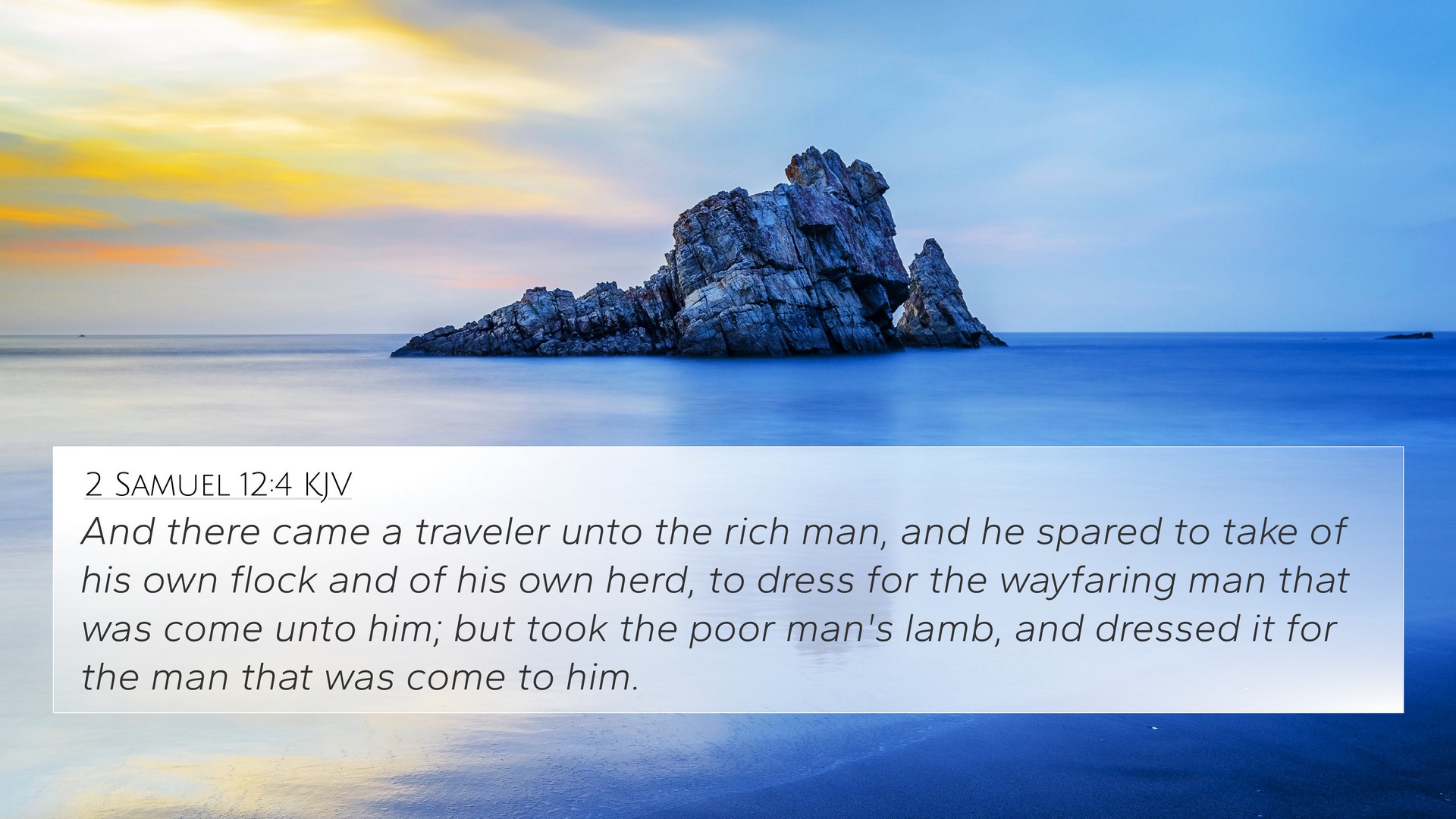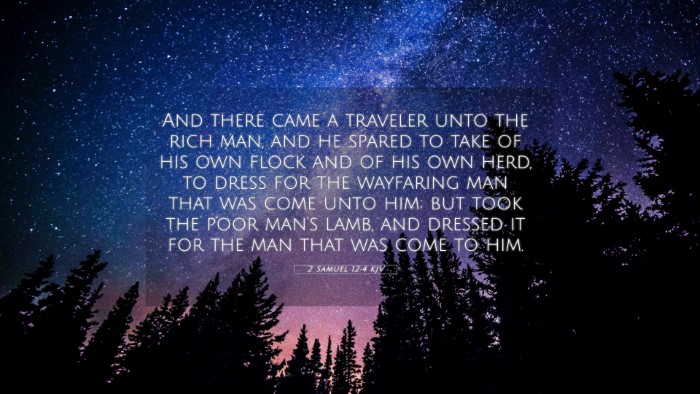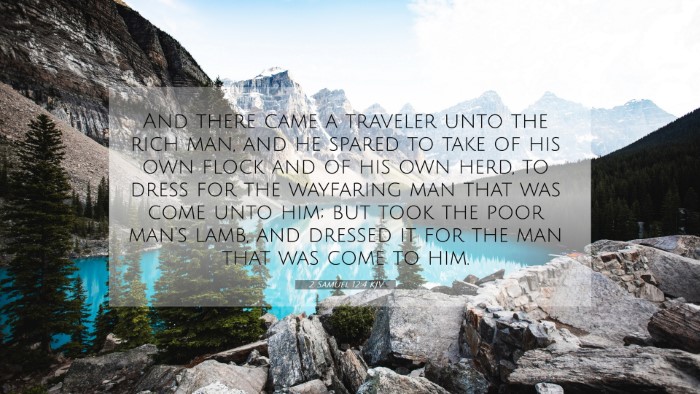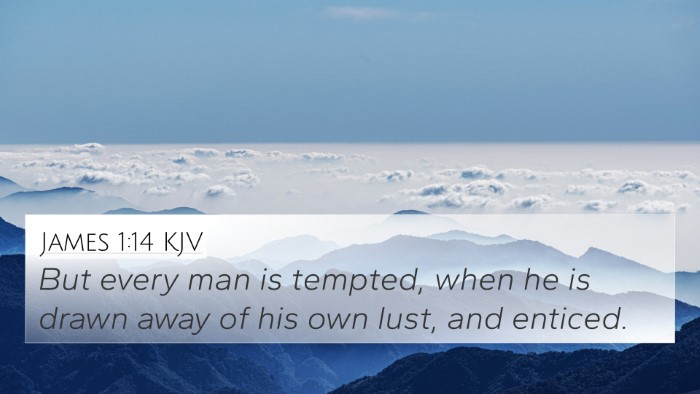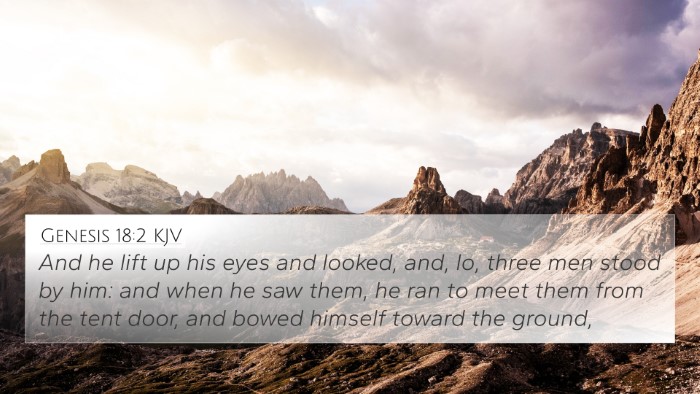Meaning and Interpretation of 2 Samuel 12:4
2 Samuel 12:4 reads: "And a traveler came to the rich man, and he spared to take of his own flock and of his own herd, to dress for the wayfaring man that was come unto him; but took the poor man's lamb, and dressed it for the man that was come to him."
This verse is part of the poignant parable delivered by the prophet Nathan to King David after David’s sin with Bathsheba. Nathan uses this allegory to confront David about his wrongdoing in a manner that allows David to recognize his error without placing him in direct accusation initially, hence inviting reflection and realization.
Contextual Background
In understanding 2 Samuel 12:4, it's essential to consider the circumstances that led to Nathan's parable. David had committed adultery with Bathsheba and orchestrated the death of her husband, Uriah. Nathan's parable serves as a device to reveal the enormity of David's sins by illustrating them through a metaphor.
Interpretative Insights
Matthew Henry's Commentary
According to Matthew Henry, this verse emphasizes the selfishness and cruelty of the rich man who has ample resources but chooses to deprive the poor man of his sole lamb. Henry suggests that this illustrates how those in positions of power often exploit those who are vulnerable, exemplifying a major moral failure.
Albert Barnes' Commentary
Albert Barnes points out that the traveler represents an external influence or request that the rich man feels compelled to respond to. Instead of offering from his abundance, he resorts to taking what belongs to the poor man, highlighting a sin of omission as well as commission. Barnes articulates that this parable serves to point out the severe injustice of David's actions against Uriah.
Adam Clarke's Commentary
According to Adam Clarke, the rich man’s action is not just a theft but a reflection of greed and moral degradation. Clarke views the taking of the poor man's lamb for a feast as indicative of a heart devoid of compassion and integrity. This vivid imagery is intended to provoke a strong emotional response, leading David to condemnation of himself.
Thematic Bible Verse Connections
2 Samuel 12:4 is intricately connected to various themes throughout the Bible. Here are several Bible verse cross-references that enhance our understanding:
- Exodus 22:1 - Discusses theft and restitution, establishing a moral code that the rich man's actions violate.
- Luke 16:19-31 - The parable of the rich man and Lazarus shares themes of wealth and neglecting the poor.
- Proverbs 22:22-23 - Warns against robbing the poor because he is poor and affirms God's justice.
- Isaiah 5:8 - Speaks to the woes of those who add house to house and field to field, promoting greed.
- James 5:1-6 - Addresses the rich exploiting the poor, akin to the rich man in Nathan's parable.
- Matthew 7:12 - The Golden Rule emphasizes treating others as one would wish to be treated, contrasting the rich man's behavior.
- Galatians 6:7 - Explains the principle of sowing and reaping, relevant to moral actions and consequences.
Comparative Bible Verse Analysis
Analyzing cross-referenced themes in the Bible regarding morality, justice, and the treatment of others sheds light on the critical lessons from 2 Samuel 12:4. The actions depicted resonate throughout various teachings in Scripture concerning righteousness and compassion.
For instance, both the Proverbial wisdom that warns against the exploitation of the vulnerable and the teachings of Jesus regarding wealth and charity provide a comprehensive view of how wealth should be managed in a way that honors God and uplifts others.
Conclusion and Reflection
2 Samuel 12:4 serves as a powerful reminder of the dangers of pride and greed. Nathan's masterful use of the parable uncovers David's sins while prompting self-reflection. In today's context, it calls for an evaluation of our relationship with wealth and how we treat those less fortunate.
Tools for Bible Cross-Referencing
For further study and to deepen understanding of how to use Bible cross-references, various tools and resources can assist:
- Bible Concordance - Helps locate verses by keywords, providing connections between texts.
- Bible Cross-reference Guide - Offers insights into linking scriptures thematically.
- Cross-reference Bible Study - Methodologies on how to approach scripture in a comparative manner.
- Comprehensive Bible Cross-reference Materials - Resources available for deeper study across multiple translations.
In conclusion, 2 Samuel 12:4 not only holds a specific narrative but also amplifies broader biblical truths about morality, justice, and the human condition. This verse stands as a focal point for understanding the continuous moral dialogue within Scripture.
